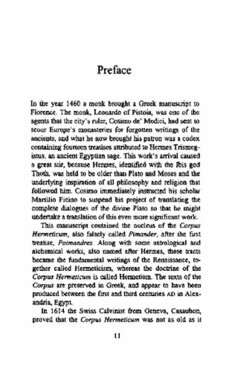
The Way of Hermes: New Translations of the Corpus Hermeticum and the Definitions of Hermes Trismegistus to Asclepius PDF
49 Pages·1999·1.098 MB·English
Most books are stored in the elastic cloud where traffic is expensive. For this reason, we have a limit on daily download.
Preview The Way of Hermes: New Translations of the Corpus Hermeticum and the Definitions of Hermes Trismegistus to Asclepius
Description:
“The Corpus Hermeticum” is a collection of short philosophical treatises, a powerful fusion of Greek and Egyptian thought, written in Greek in Alexandria between the first and third centuries AD and rediscovered in the West in the fifteenth century when it was first translated into Latin by the great scholar and philosopher Marsilio Ficino. These writing were believed from antiquity up to the early seventeenth century to be the writings of Hermes Trismegistus, ‘thrice-great Hermes’, the name given by Greeks of the classical and Hellenistic periods to the Ibis-headed Egyptian god Thoth. They were central to the spiritual work of Hermetic societies in late antique Alexandria, aiming to awake gnosis, the direct realisation of the truth of the identity of the individual and the Supreme, and are still read as inspirational writings today. Professor Mahe's translation of “The Definitions of Hermes Trismegistus to Asclepius” has been made from an old Armenian version and a recently rediscovered Greek manuscript in the Bodleian Library, Oxford. This collection of aphorisms is closely related to parts of the "Corpus Hermeticum".
See more
The list of books you might like
Most books are stored in the elastic cloud where traffic is expensive. For this reason, we have a limit on daily download.
